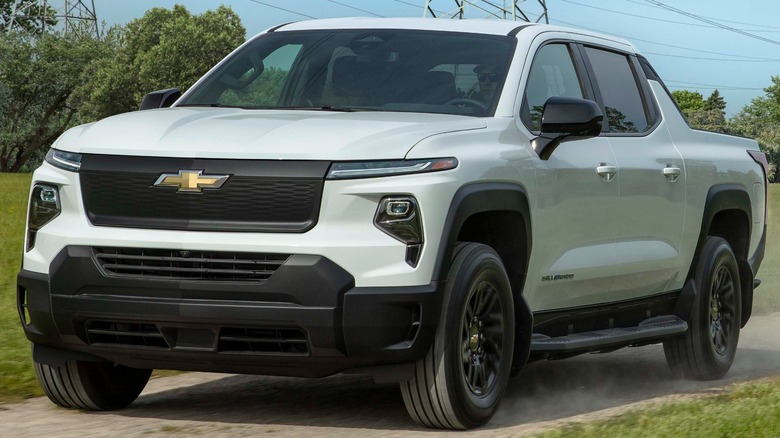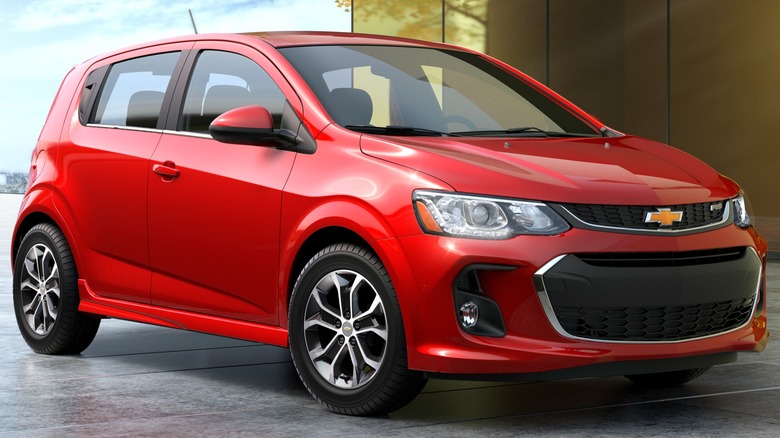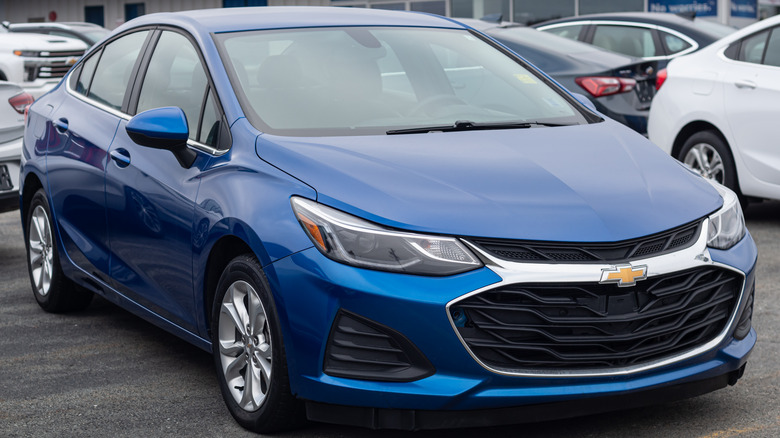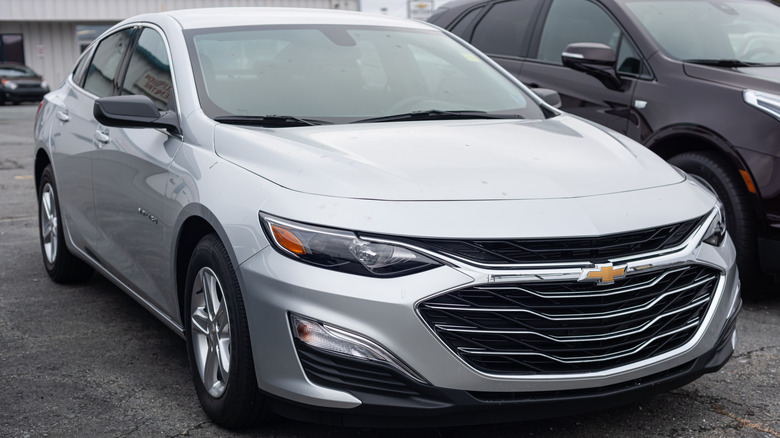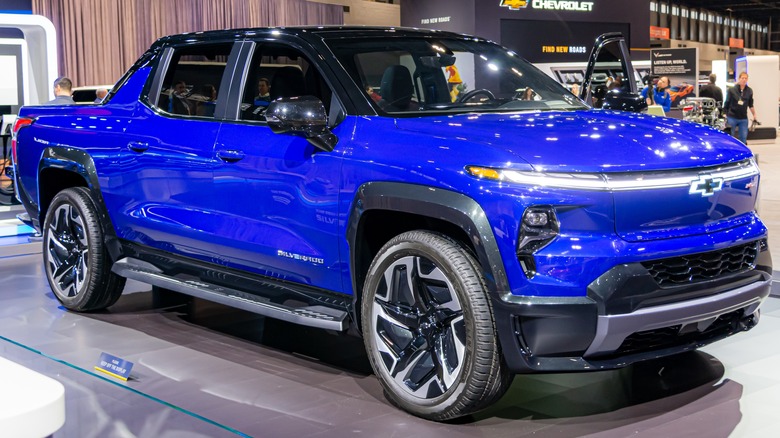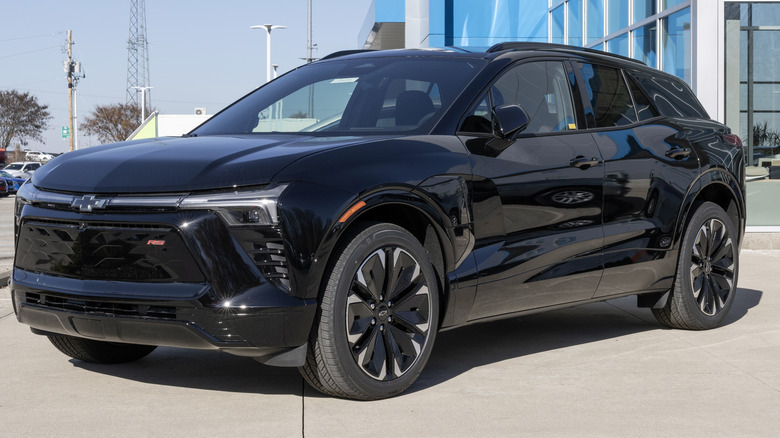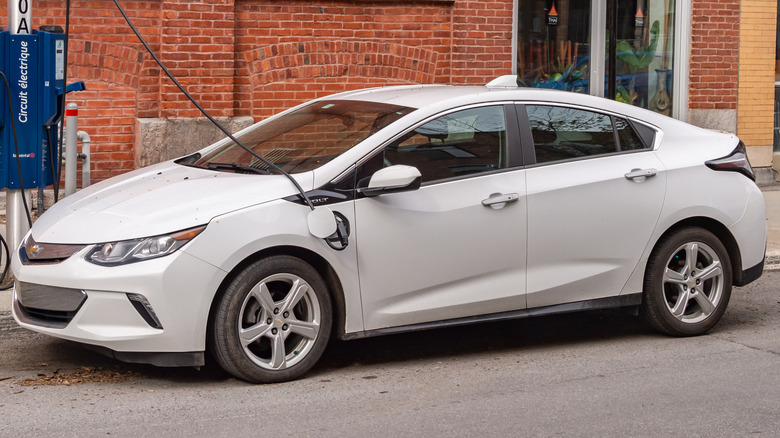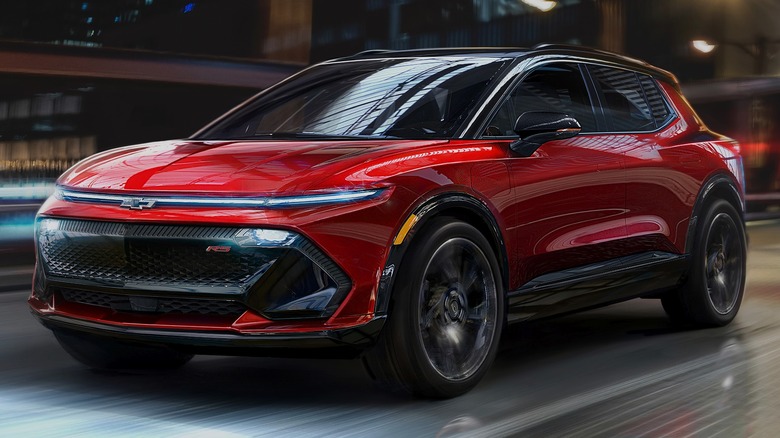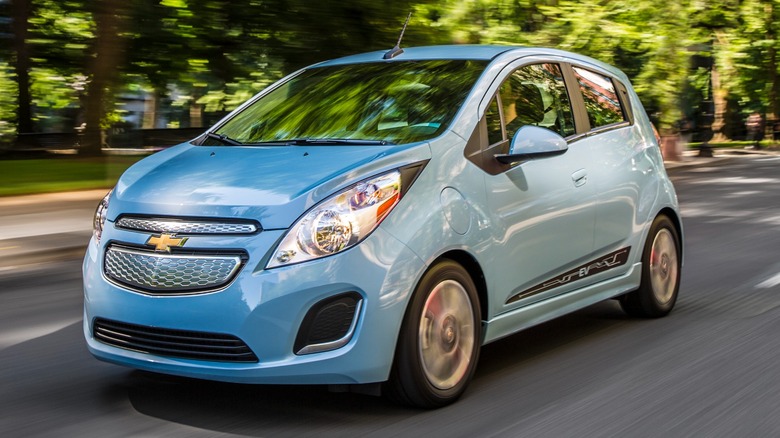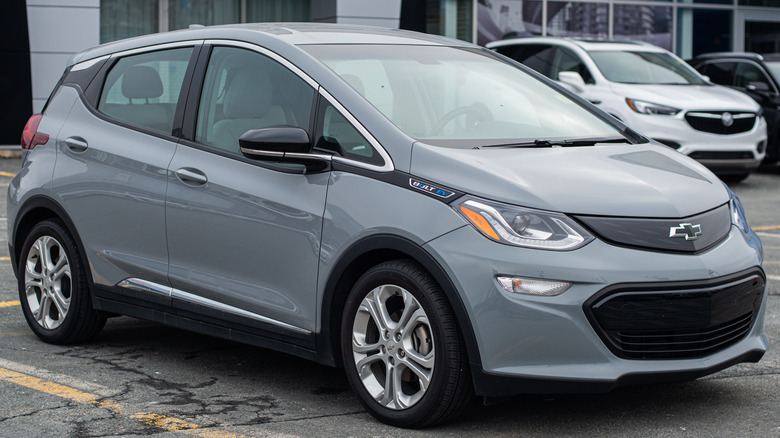10 Of The Most Fuel-Efficient Chevrolets Ever Made
Chevrolet, an automaker synonymous with American car culture, has long been known for its iconic muscle cars and powerful engines — from the legendary Camaro to the roaring Corvette. However, the modern automotive landscape has transformed due to environmental consciousness and increasing fuel prices. To combat this, automakers, including Chevrolet, have had to respond by prioritizing innovative green technologies and fuel efficiency.
In the modern world, fuel-efficient vehicles put less strain on the wallet, reducing overall running costs. They also contribute to a cleaner environment, with every gallon saved translating to a smaller carbon footprint. Chevrolet's commitment to fuel efficiency is evident across its lineup. From modern family sedans like the Malibu to capable pickup trucks like the Silverado EV, Chevrolet offers a range of options with innovative technologies.
The lineup not only uses internal combustion engines, but also hybrid and electric technology to push the boundaries of efficiency altogether. Below, we explore some of the most fuel-efficient Chevrolets ever made, highlighting the innovative technologies that have led to their impressive fuel economy ratings.
2018 Chevrolet Sonic – 32 MPG
The 2018 Chevrolet Sonic was a subcompact vehicle available as a hatchback or sedan. The Sonic sedan had three trims: LS, LT, and Premier, while the hatchback only had two: LT and Premier. For the 2018 model year, Chevrolet made a few changes to the Sonic, including adding an RS package, Sheffield seat trim for the RS package, and a new Ivy Metallic exterior color. As standard, the lineup used a 1.8-liter four-cylinder engine with 138 horsepower and 125 lb-ft of torque. The engine paired with a five-speed manual transmission as standard on all sedans. However, only the LT hatchback had the manual as standard. Chevrolet also offered a six-speed automatic on some trims.
In the base configuration, the Sonic had an EPA fuel economy rating of 26 mpg city, 35 mpg highway, and 29 mpg combined. It also offered 354 miles of total range from its 12.2-gallon tank. Chevrolet also offered the Sonic with a more powerful 1.4-liter turbocharged four-cylinder engine. It produced 138 horsepower and 148 lb-ft of torque. Unlike the base powertrain, the turbocharged engine paired with a six-speed manual was standard on Premier trim and optional on LT trim. There was also an optional six-speed automatic available in some trims.
With the standard six-speed manual transmission, the Sonic sedan and hatchback models had the best fuel economy rating of 28 mpg city, 37 mpg highway, and 32 mpg combined. These models also had a 12.2-gallon fuel tank, which enabled them to offer up to 390 miles of total range.
2000 Chevrolet Metro – 36 MPG
When Chevrolet introduced the Metro, it was a low-cost vehicle available in two body styles: hatchback and sedan. While the Metro's design was similar to that of the Suzuki Swift, it had two powertrains: a 1.0-liter three-cylinder and a 1.3-liter four-cylinder. The base models used the 1.0-liter three-cylinder engine with 55 horsepower and 58 lb-ft of torque. This engine paired with a five-speed manual transmission, powering the front wheels. Despite its humble performance figures, the base Metro was the most efficient model in the lineup with an EPA fuel economy rating of 32 mpg city, 41 mpg highway, and 36 mpg combined.
The 1.3-liter four-cylinder engine had more oomph, producing 79 horsepower and 75 lb-ft of torque. The engine paired with either a five-speed manual or a three-speed automatic. With the five-speed manual, the Metro had a fuel economy rating of 31 mpg city, 38 mpg highway, and 34 mpg combined. The automatic transmission variants had the lowest fuel economy rating of 26 mpg city, 31 mpg highway, and 28 mpg combined. In addition to its powertrains, the Metro had a four-seat interior despite the hatchback only being available as a two-door. It also featured modern standard equipment like a remote trunk release, power locks, and power steering.
2019 Chevrolet Cruze – 37 MPG
The 2019 Chevrolet Cruze was a compact car, available as a sedan or hatchback. The sedan had a lower MSRP of $18,870, while the hatchback's MSRP was $20,495. For the 2019 model year, Chevrolet restyled the Cruze's front end, fitting it with new headlamps, fascia, and grille. At the rear, the Cruze also got revised taillamps with LED signature lighting on the higher trims. Additional improvements to the 2019 Cruze included new interior colors and an infotainment system.
As standard, the Cruze used a 1.4-liter turbocharged four-cylinder engine with 153 horsepower and 177 lb-ft of torque. This engine mated with a six-speed automatic transmission, powering the front wheels. The gasoline four-cylinder was the peppiest engine in the lineup, enabling the Cruze to dash from 0 to 60 mph in 7.7 seconds. With this powertrain, the Cruze had an EPA fuel economy rating of 30 mpg city, 38 mpg highway, and 33 mpg combined.
Chevrolet also offered a 1.6-liter turbocharged four-cylinder diesel engine with 137 horsepower and 240 lb-ft of torque for maximum efficiency. This powertrain paired with a nine-speed automatic, powering the front wheels. Unlike the gasoline four-cylinder engine, the turbodiesel had a better EPA fuel economy rating of 31 mpg city, 48 mpg highway, and 37 mpg combined. This helped give diesel Cruze models a better range of 500 miles from a 13.5-gallon tank compared to 452 miles from a 13.7-gallon fuel tank in the gasoline-powered models.
2019 Chevrolet Malibu – 46 MPG
The Chevrolet Malibu is a mid-sized family sedan competing with variants like the Honda Accord and Toyota Camry. For the 2019 model year, Chevrolet slightly refreshed the Malibu, giving it a restyled front and rear. The lineup had six trims: L, LS, RS, LT, Hybrid, and Premier. As standard, the Malibu had a 1.5-liter turbocharged four-cylinder engine with 163 horsepower and 184 lb-ft of torque. The engine paired with a continuously variable automatic transmission (CVT), powering the front wheels. In this configuration, the Malibu had a good EPA fuel economy rating of 29 mpg city, 36 mpg highway, and 32 mpg combined.
In addition, Chevrolet also offered a more potent 2.0-liter turbocharged four-cylinder engine with 250 horsepower and 260 lb-ft of torque. This engine paired with a nine-speed automatic transmission, powering the front wheels. While it was more powerful than the base powertrain, it had the lowest fuel economy rating of 22 mpg city, 32 mpg highway, and 26 mpg combined.
The Malibu Hybrid was the most efficient model on the lineup, boasting 49 mpg city, 43 mpg highway, and 46 mpg combined. This model paired a 1.8-liter four-cylinder engine with two electric motors to produce 182 horsepower and 277 lb-ft of torque. These motors used an 80-cell 1.5 kWh battery pack, which enabled the Malibu Hybrid to drive up to 55 mph on electricity. The Malibu Hybrid had unique technology, including the Volt's regenerative braking system to recover energy when braking and Exhaust Gas Heat Recovery (EGHR) to keep the cabin and engine warm using exhaust heat.
2024 Chevrolet Silverado EV – 67 MPGe
Chevrolet's Silverado EV is a reimagined version of the ICE-powered Silverado full-size pickup truck. The 2024 Silverado EV uses GM's Ultium platform, helping deliver a blend of capability and performance, including a range of up to 450 miles on a single charge. Despite being less than the turbodiesel-powered Silverado's 624 miles, the Silverado EV boasts more power from its dual motor powertrain. In the WT trim, the Silverado EV produces 510 horsepower and 615 lb-ft of torque. While it's not the most powerful version in the Silverado EV lineup, the WT trim boasts a maximum payload capacity of 1,750 pounds and a towing capacity of 12,500 pounds.
The Silverado RST EV is the most powerful variant, producing 754 horsepower and 785 lb-ft of torque. This makes it the most powerful Silverado ever built, allowing it to dash from 0 to 60 mph in under 4.5 seconds with Wide Open Watts. The RST trim gets plenty of additional features, including an e4WD system, automatic adaptive air suspension, four-wheel steer, and Chevrolet's advanced trailering system. Unlike the ICE-powered counterparts, the Silverado EV is more efficient, boasting an EPA rating of 72 MPGe city, 62 MPGe highway, and 67 MPGe combined.
To keep it juiced up, Chevrolet equips the Silverado EV DC fast charging capabilities of up to 350 kilowatts, allowing owners to add 100 miles of range in 10 minutes. The 2024 Chevrolet Silverado EV also gets Level 1 120-volt and Level 2 240-volt home charging solutions, allowing owners to conveniently recharge the truck from the comfort of their homes.
2024 Chevrolet Blazer EV – 96 MPGe
The 2024 Chevrolet Blazer EV is a mid-size electric SUV that helps expand the brand's EV portfolio. It has a $48,800 starting price and three trims: LT, RS, and SS. For the 2024 model year, the Blazer EV rivals other electric SUVs like the Volkswagen ID.4, Tesla Model Y, and Kia EV9. As standard, the 2024 Chevrolet Blazer EV uses a dual motor powertrain to power the front and rear axles. These motors produce 288 horsepower and 333 lb-ft of torque.
Chevrolet also offers a single-motor powertrain in the RS trim, which only powers the rear axle. Despite having a single motor, this powertrain boasts 340 horsepower and 325 lb-ft of torque. The RS RWD version also gets a larger 102-kWh battery pack compared to the 85-kWh pack in the base LT and RS AWD models. Thanks to the larger battery pack, the Blazer EV RS RWD model has a longer range of 324 miles compared to the AWD's 279 miles. However, despite having more range, the Blazer EV RS RWD gets an EPA rating of 99 MPGe city, 84 MPGe highway, and 92 MPGe combined. That's slightly lower than the Blazer EV AWD models, which boast 103 MPGe city, 88 MPGe highway, and 96 MPGe combined.
As for the Blazer EV SS trim, it's the most powerful variant in the lineup, boasting 557 horsepower and 648 lb-ft of torque. While Chevrolet has yet to disclose its pricing, the SS trim can scamper from 0 to 60 mph in under four seconds with Wide Open Watts.
2019 Chevrolet Volt – 106 MPGe
The 2019 Chevrolet Volt was a compact plug-in hybrid with a $34,395 starting price and two trims: LT and Premier. For the 2019 model year, Chevrolet added features like a 7.2 kilowatts charging system, a new infotainment system, decorative seating patterns on cloth seats, and new exterior colors. One of the most attractive features of the Chevrolet Volt was its plug-in hybrid powertrain, which paired an Ecotec 1.5-liter engine with a Voltec electric drive system to produce 149 horsepower and 294 lb-ft of torque. The electric system used an 18.4 kWh battery pack, which could recharge in 13 hours when using the 120-volt charger and 2.25 hours when using the 240V charger with the 7.2 kilowatts charging module. However, the 240-volt charger with the 3.6 kilowatts charging module could take 4.5 hours.
With this powertrain, the Volt could drive up to 53 miles on electric power or up to 420 miles with a full tank of gas and full charge. The powertrain also had a great EPA economy rating of 106 MPGe combined. On its own, the gasoline engine could offer 42 mpg combined fuel economy. To increase efficiency, Chevrolet equipped the Volt with a Regen on Demand feature, allowing the driver to control energy regeneration through a steering wheel-mounted paddle. In addition to its efficiency, the Volt had an accommodating cabin with modern equipment like heated rear outboard seats, wireless charging, a Bose premium audio system, a built-in Wi-Fi hotspot, and Apple CarPlay and Android Auto compatibility.
2024 Chevrolet Equinox EV – 108 MPGe
Chevrolet's 2024 Equinox EV is an all-new model aimed at ushering buyers into the Chevrolet EV world. The Equinox has a starting price of $41,900 and five trims: 1LT, 2LT, 2RS, 3LT, and 3RS. As standard, the Equinox EV has a single electric motor that powers the front axle. This motor produces 213 horsepower and 236 lb-ft of torque. While it's not as powerful as the Tesla Model Y, the Equinox EV boasts a range of 319 miles compared to the Tesla's 310 miles. In addition, this powertrain delivers the best fuel economy rating of 117 MPGe city, 99 MPGe highway, and 108 MPGe combined.
Chevrolet also offers a more potent dual-motor powertrain that powers the front and rear axles. The powertrain produces 288 horsepower and 346 lb-ft of torque, enabling the Equinox EV to tow a maximum of 1,500 pounds and scurry from 0 to 60 mph in 5.9 seconds. The dual motor powertrain isn't as efficient as the base offering, managing an EPA fuel economy rating of 101 MPGe city, 90 MPGe highway, and 96 MPGe combined. In this configuration, the Equinox EV has a total range of 285 miles, still outcompeting the Model Y's Performance 279 miles range. Furthermore, Chevrolet equips the Equinox EV with the latest charging technology, which includes 11.5-kilowatt Level 2 charging as standard, two-kilowatt Level 2 charging, and DC fast charging of up to 150 kilowatts.
2016 Chevrolet Spark EV – 119 MPGe
The 2016 Chevrolet Spark EV was an electric minicar that promised easy ownership and emissions-free driving. It rivaled other green and energy-efficient cars like the Ford Focus EV, Honda Fit EV, and Nissan Leaf. Unlike these rivals, the Spark had a lower starting price of $25,995 before any state and federal tax credits. The Chevrolet Spark EV had a single electric motor powering the front wheels. The motor produced 140 horsepower and 327 lb-ft of torque, helping it dash from 0 to 60 mph in 7.2 seconds. This electric powertrain made the Spark EV capable and efficient, getting a great EPA rating of 128 MPGe city, 109 MPGe highway, and 119 MPGe combined.
In addition to the electric motor, the Spark EV had an enhanced design to reduce drag while guiding air around the vehicle. The changes made to its aerodynamics included tire air deflectors, underbody panels, a closed upper grille, an active shutter system, low rolling resistance tires, and a roof-extending rear spoiler. These enhancements gave the Spark EV a 0.326 drag coefficient and 82 miles of total range. Chevrolet also equipped the Spark EV with two driving modes: Normal and Sport. Normal mode was the default mode and it helped maximize the Spark EV's efficiency.
On the other hand, Sport mode offered a sportier driving experience, giving the driver more responsive acceleration. Like most modern EVs, the Spark EV had different charging options: 120 V, 240 V, and DC fast charging. With the standard 120-volt charger, the Spark EV could recharge in about 20 hours. Fortunately, DC fast charging could juice up the Spark EV to 80% in 20 minutes.
2023 Chevrolet Bolt EV – 120 MPGe
The Chevrolet Bolt EV is an affordable all-electric car, available as a hatchback or SUV (Bolt EUV). For the 2023 model year, the Bolt EV had a $26,500 starting price and two trims: 1LT and 2LT. Thanks to its lower starting price, the Bolt EV outcompetes small rivals like the Hyundai Kona Electric and Tesla Model 3. Chevrolet pairs the Bolt EV with an electric motor powering the front wheels. The motor produces 200 horsepower and 266 lb-ft of torque, helping the Bolt EV sprint from 0 to 60 mph in 6.5 seconds. The Bolt EV also has an advanced 65 kWh battery pack and an 11.5 kilowatts onboard charging module, allowing it to fully charge in seven hours with the 240-volt cord.
Chevrolet's electric powertrain helps make the Bolt EV competitive, giving it 259 miles of total range and an EPA economy rating of 131 MPGe city, 109 MPGe highway, and 120 MPGe combined. In addition to its efficiency, the Bolt EV has additional technologies like Regen on Demand and one-pedal driving, which help regenerate and restore energy in the battery pack. The Bolt EV also gets a Sports Mode button, which boosts the acceleration's responsiveness and provides a more engaging driving experience.
